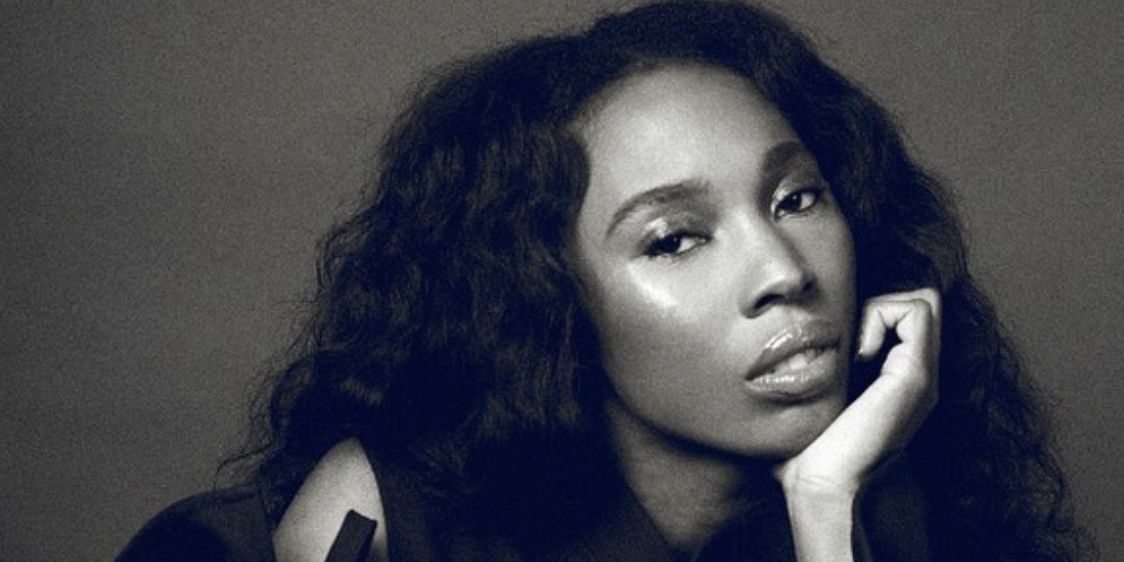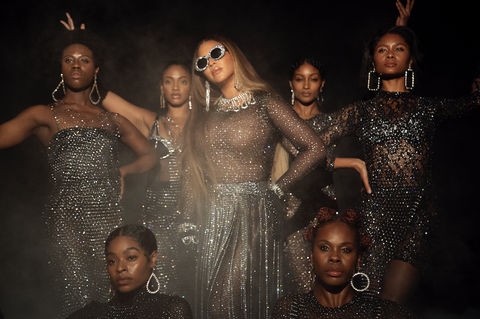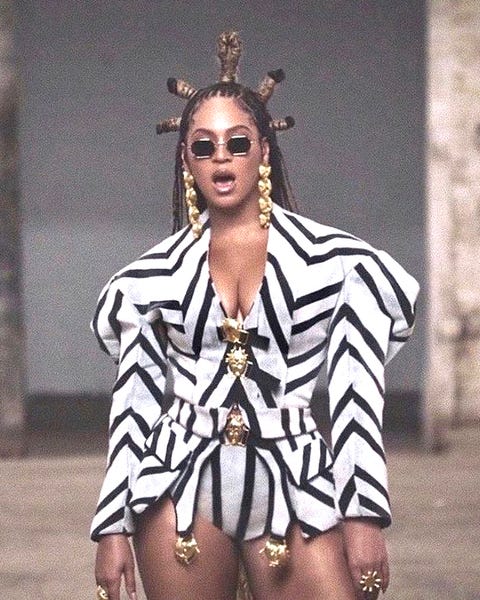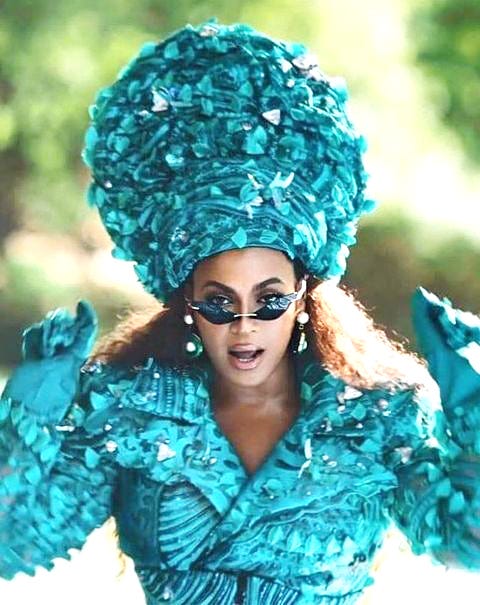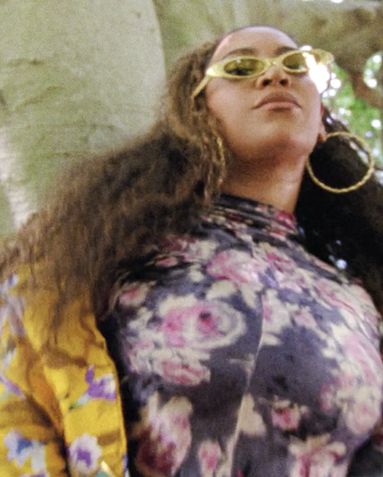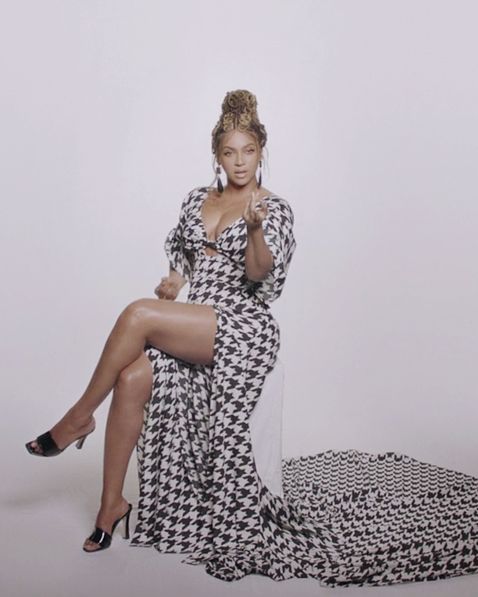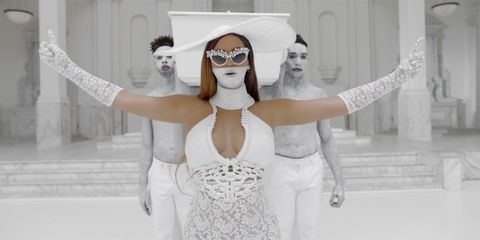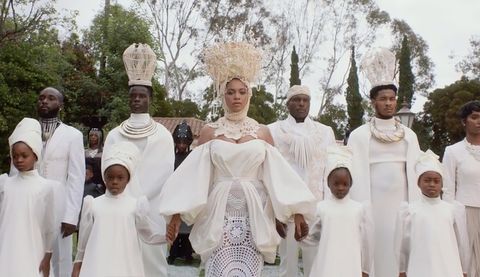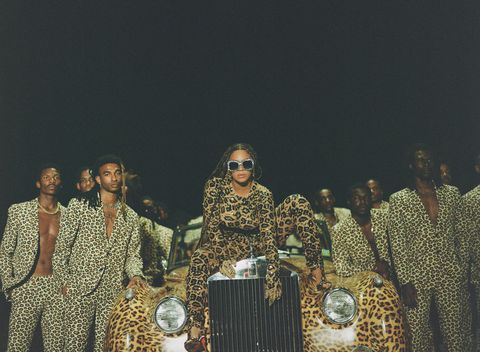“You were the one posting all those [Instagram] Stories, right?”
It’s three days after Beyoncé’s jaw-dropping, feast-for-the-eyes Black Is King visual album dropped on Disney+, and I’m on the phone with her stylist, Zerina Akers, the woman behind the fashion fantasies that dazzle in the film and on Beyoncé in general.
“You were on it,” she says, referencing my obsessive identification of key looks on social media. No, Zerina, you were on it.
Akers, who got her start as an intern in the fashion closet at W magazine, has been working with Beyoncé for the last six years. Growing up in Landover, Maryland, she used to test her fashion knowledge by flipping to a magazine page and identifying the designer credits without looking. The W internship led to jobs assisting stylists like Camilla Nickerson, Lori Goldstein, and B. Akerlund. It was on a shoot with B. Akerlund that Akers first crossed paths with Beyoncé. A few months later, she heard that Beyoncé was looking for a full-time stylist, and after a one-month trial, Akers was in. A match made in fashion heaven, their first collaboration was on the Beyoncé’s Instagram editorials back in 2014, which have become part of Beyoncé’s visual storytelling. With every project they embark on together, they go bigger, harder, than the last. Black Is King is testament to that.
“It’s surreal,” Akers says about working on the visual album, which is the defining pop culture moment of the year (in my opinion). “It’s humbling. It’s exciting, and it’s scary, to be honest. I didn’t expect such a tremendous response. It’s a different thing when you’re in it. You’re kind of buried in it and you don’t know. You’re kind of putting one foot in front of the other, but now, for it to be out and so well received, it’s pretty tremendous.”
Tremendous indeed, given the backstory of how Black Is King came together. Let’s dive right into it.
How was that initial sit-down, planning the look of the film?
There wasn’t [one]. It was, “Hey, I just want to shoot these little clips to do a small piece to boost the album. And I want to, you know, maybe just shoot it in my backyard, and, like, Zerina, you’re here.” When we started, I think we maybe got a day into shooting and it was, “You know what? Let’s take a pause. Actually, let’s do a full video for everything.” And then it snowballed from there. It was going as it was going. It took about two months and three weeks.
So it was a fairly quick turnaround of rethinking everything?
Oh, no. I always overdo it, because it’s Beyoncé and you just never know. She can get an idea and want to just put a wedding gown on in the pool. So it’s always about having a little bit of everything, from T-shirts to couture gowns. I like to have as much as I can, just to be ready for the curveball. As we were shooting, there were packages constantly coming in. There were boxes arriving to set off the runway. We’re constantly making things, calling designers at midnight, like, “Hey, can you meet me at 8 a.m. and let’s design this thing together.” A lot of the L.A. designers were constantly making things for us as we were going.
What was the process for choosing the designers for each look for each visual?
Take, “Find Your Way Back,” for example. Knowing that everything has to sparkle—there’s a few friends of mine that I’ve worked closely with for years—Destiny of D.Bleu.Dazzled, Laurel Dewitt and Kerin Rose of A-Morir sunglasses, and Lace by Tanaya. They’re people that I know love sparkles, and everything is about crystals and dazzling, so those are four people that I automatically call to create something.
When I work with them, I like to push them and stretch them as well—like, Laurel Dewitt is an accessories designer. She doesn’t really make clothes per se. So I pushed her to actually do that and work with another brand, Alejandro, to stretch her. Lace by Tanaya typically makes accessories and underwear and lingerie, but to get her to make a full crystal poncho and skirt that looked like raindrops—she really killed it. Pushing her to make a full garment was interesting.
Other times, we may be on set and Beyoncé wants to keep shooting and keep changing clothes, and I’ll have to figure it out on the spot. So there’s not necessarily one way.
I was really happy to see a lot of Black designers and Black-owned businesses utilized in the styling. How important was that for you? How did you choose the Black designers you worked with?
That’s important for me, for every project we’re on to just consistently amplify the voices and the visibility of Black designers. I specifically wanted to work with L’Enchanteur. They’re twin sisters; they’re Nigerian, born and raised in Brooklyn. They interpret their jewelry with a traditional African artistry approach, but a little bit ghetto. They take a [hair] track or a hair roller and dip it in gold. To me, that is the epitome of exactly what this visual album called for. It’s highlighting and celebrating Africa and the African diaspora.
I also love including just a little bit of the street, a little bit of what we grew up with here in America in the inner city, from hair rollers to long fingernails to gold earrings. It’s important. That’s a part of our culture too. Those are pillars in my memory as a young Black girl.
I want to break down the major Black designer moments, starting with Loza Maléombho, who I think you worked with for the “Formation” video.
I called in a lot of her pieces for “Formation,” but it didn’t end up on Beyoncé, so I’ve been trying every now and then to include her. So this piece, interestingly enough, started out as pants, and we turned the pants into little hot shorts, because Beyoncé wanted to dance in them. Typically, a lot of West African fabrics don’t stretch, so we had to create these gussets under the arms, so she could have some freedom of movement. It’s about being able to evolve these looks. I was just so happy that that look landed where it did—with Loza’s use of bright gold mask buttons complementing the L’Enchanteur jewelry so well.
What’s the story behind that 5:31 Jérôme blue Nigerian lace look that we see in “Already”?
I love that look. Jerome was one of the first designers I lured in to work on this. He is a very good friend of mine, and we have been working together for many looks for Beyoncé. He supported me very early on in my career. He had gotten out of designing, but he’s so talented. I kind of lassoed him back in and he was down. We met in the Fashion District, where we just hashed it out and he sketched something.
I told him I was inspired by women at Nigerian weddings and the power, the strength, and the essence of these matriarchal Nigerian women and, you know, how not to mess with them. I wanted to take that and make it a bit more modern, a tough woman with a gele-inspired headpiece. But how do we project that onto this badass pop star?
So we found the fabric, picked one that we liked, and we just went for it. He made this beautiful trench dress with this corset on top with boxing gloves. Don’t ask me how he got the gloves that don’t stretch to work. The gloves actually attach to the jacket. He also made the glasses, and I connected him with the milliner Sarah Sokol to create the headpiece. It all came together quite well with the men in face paint with the cowrie shell LaFalaise Dion headpieces. Some of those shots were just stunning.
I’m curious about the floral Levenity jacket and S. Garvey bodysuit moment…
I had just taken on a whole new team of assistants in New York. I decided to take a risk since the project came up basically overnight. I hired five new assistants that I had never worked with. Beoncia Dunn was the first one. I was intrigued by her. We had been in touch on social media, and I could tell she had very little to work with and she really made beautiful art out of these tulle dresses, that you could tell she may have hand-sewn. I wanted that kind of aesthetic, I wanted someone with that kind of drive and heart in this project.
We could implement these DIY fantasy textures into the looks, and she brought on S. Garvey, who is just a young girl sewing out of her house in Brooklyn. We went to her house on a Sunday, when there were no fabric stores open. But we found two small fabric stores in Brooklyn that were open that day, and we just went in there and we found something I wanted. I had been on set with these floral-on-floral things that you can sort of see in the tea party in “Mood 4 Eva” and through the metallic floral motor gang in “Already.” So we had a few of the catsuits made with the masks.
Beyoncé wanted to explore these exaggerated silhouettes, and one way of exploring that was with these overly exaggerated shoulders on the trench dress. So I called Venny Etienne of Levenity. I said, “I want something like this, something with a shoulder. Come up with something.” He sketched it, and, again, I think it was the weekend, and the only fabric store was open for another hour, and he found something, and we went with it.
I just paired the two together and took the extra fabric. I always have designers send extra fabric, because I like to cover shoes or need them for alterations. I also like to have extra fabric to play with if we have to make a bodysuit to go underneath. We created a turban to go on top of the mask. I then took these heels, put strings on them, tied them up [Beyoncé’s] leg, and tied flowers onto the string.
Another look I found striking was the Tongoro houndstooth dress in “Brown Skin Girl.”
Sarah [Diouf] is very near and dear to me. Beyoncé was one of the early supporters of her brand, and she’s been very supportive of us. She put out a collection with women in all black and white with do-rags to match, and I just fell in love with it. I thought it would contribute very beautifully as a tableau in the story. But in the end, Beyoncé just wore them standing alone.
One of the dresses is an off-the-shoulder black dress that was actually made for “Spirit.” It’s very elongated with a long train, and then she rush-made this series of dresses for us, and that’s exactly what it turned into: a black and white series. So you see Beyoncé in the houndstooth, and then you see these other two women leaning on each other with the head wraps. That’s the same Tongoro series that she sent to us.
Can we talk about that white Deviant La Vie look in “Nile”?
This look was quite stunning. We made it as an option for the chess piece, but it didn’t work there in the end. This was a bit of a last-minute shot that we decided to steal at the end of the day when we shot “My Power.” It’s in the same location, so it just worked. It was custom-made for Beyoncé with the glasses from Kerin Rose, and Francesca [Tolot]—and the face paint just sealed the deal.
And what I love about that scene is that it’s almost like there’s this widow when you lose a loved one, you see Beyoncé in front of the casket, and then you see her being carried, it’s almost like you lose a piece of yourself as well. So that was a really powerful scene. For Brittany [of Deviant La Vie] (in collaboration with Alani Taylor) to be able to create the white lace skirt, the top, the hat—it all came together beautifully.
I’d like to touch upon the LaFalaise Dion accessories that I remember also being in the “Spirit” video.
So after the “Spirit” video, we had stayed in touch. She had started making these bras and more constructed garments. She was kind enough to send us practically 20 pieces. She sent us her entire collection to sort of use and abuse, and we did just that. And it really contributed in multiple points in the film and gave it the texture. The use of the cowrie shells was a nod to when they were used as currency. To have them present and on the body in the film was a nod to that opulence, and to the past.
One of my favorite visuals, hands-down, is “Mood 4 Eva.” Walk me through how the look of that came about.
So Beyoncé wanted to do this very over-the-top, almost a parody of opulence and decadence. I had different concepts where I wanted to have a Chanel bathrobe, which they didn’t make, so I made a tweed one myself.
This content is imported from Instagram. You may be able to find the same content in another format, or you may be able to find more information, at their web site.
I had Melissa Simon-Hartman do the entire black section of the chess piece. I wanted it to feel a bit like dark versus light. In the end, I stripped away a bit of the gothic mood that it represented, and then kept the other side a bit more soft and sweet. So even in the bishop headpiece, I wanted it to feel like an African priest. I wanted the horsemen to feel like a female warrior.
It evolved quite a bit. “Mood 4 Eva” was single handedly the largest project I’ve ever worked on in terms of scale and people. We had about 70 extras, and having to dress them all, it wasn’t just one large scene at once. It was five or six scenes with 20 to 30 people in each scene, and one where there’s everyone.
Working on the synchronized swimming look was quite the task. Sharon [Rahim] from L.A. Roxx made, I believe, in two days, all of the catsuits for the swimmers. Dressing the Black girl synchronized swimmers in these crystal swimsuits was just stunning. Venus Prototype made the latex swim caps, and Timothy White really transformed a Solace London dress into a corseted bodysuit. And he custom-made the headpiece. He put crystals all over the dress and on the gloves. Beyoncé had this idea that she wanted cat-eye goggles, so Kerin Rose brought those to life for us. So it was this really opulent experience of wanting to, and even leaning into the world of André Leon Talley, like, decked out in Louis Vuitton playing on the tennis court. That’s what I wanted it to feel like, just over-the-top.
And the animal-print fantasy?
When we worked on the all-leopard and animal-print pieces, many people hadn’t successfully mixed animal prints in that way, and on so many people. It feels like the old lady gang in Harlem, but still speaks to a very modern woman, a very strong woman—it’s really beautiful and Valentino! This is the first time, I believe, that Valentino Couture has been shot in a music video. That’s typically reserved for red carpet.
So it took five people on the catsuit and five people on the jacket 300 hours each to make that look, and I think it was damn worth it! That shot with Beyoncé wrapping her Rolls-Royce in this cheetah print and OppoSuits! They were another unsung hero in the film.
All the creativity and passion that went into this project is so inspiring. What would you say to Black kids looking to get into fashion?
Keep going. Do your research. Don’t be afraid to reach out to people. If you want to get into styling, maybe it’s not reaching out directly to the stylist, maybe it’s being in touch with the assistant and really wanting to serve that assistant well. Go on informational interviews. There are a lot of us that are willing to talk, willing to mentor, even if we may not be in a position to give you a job. So do that. If you send 50 emails and you get one back, you’re going somewhere. Just keep going.
This content is created and maintained by a third party, and imported onto this page to help users provide their email addresses. You may be able to find more information about this and similar content at piano.io
